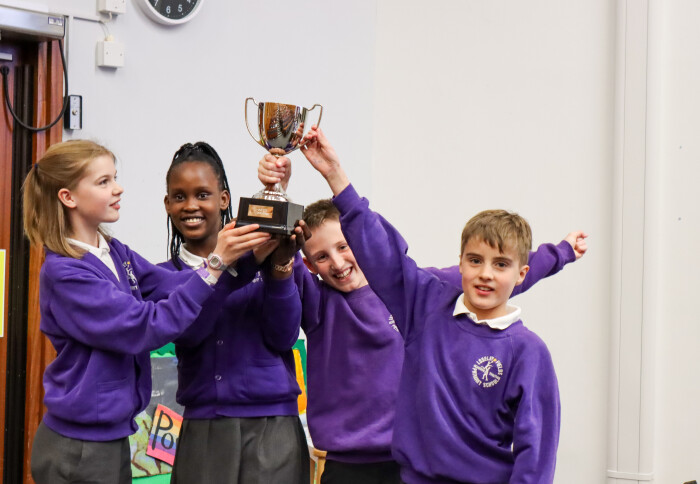Budding scientists tackle the UN Sustainability Development Goals
by Jacklin Kwan

Redesigning drones and using shellfish to clean water were ideas presented by students in this year’s Schools Science and Innovation Competition.
The competition is run by the Faculty of Natural Sciences (FoNS) at Imperial College London, and asks young students aged from four to 19 years old to imagine how they would help achieve one of the United Nation’s Global Goals for Sustainable Development.
Contestants presented their ideas to a panel of Imperial researchers, explaining their innovative solutions to present sustainability challenges, as well as the science behind their idea.
Students competed in five different age categories and the competition was open to schools, charity organisation, community groups and youth groups.
“Getting young people to engage in competitions like this, which takes them beyond the school curriculum and allows them to apply their knowledge alongside their imagination, is vital for developing the next generation of scientists,” said Dr Simon Foster, the FoNS Outreach Officer, “I can’t wait to see what these young people do in the future.”
Congratulations to this year’s winners:
- 4 - 11 years winners: Power to the People
- 11 – 14 years winners: The EdVenture seekers
- 14 – 16 years winners: Team CRAGE
- 16 – 19 years winners: EcoChroma
- Open group winners: The Stemettes
Community-driven change
The winning team from the youngest age category (4-11 years old) focused on sustainable changes their local school could make, from switching to renewable energy sources to reducing their consumption of piped water.
Power to the People calculated how much grey water could be collected from the surface area of their school roof, as well as whether their school could meet its energy needs using solar panels. The students also explored starting a community garden which could grow food, reducing the carbon intensity of their school meals.
Other teams presented their own ideas on how to tackle different sustainability challenges, including a website that could give resources on female empowerment, as well as a water filter that could remove microplastics in the ocean, inspired by the whale shark.
 “It was an amazing opportunity to introduce the UN Goals to the children, and through that, figure out the problems that were important to them,” said Nelly Ali, a parent who attended the competition. “It was amazing to give them an opportunity to express these interests to others who cared about the same,” she said.
“It was an amazing opportunity to introduce the UN Goals to the children, and through that, figure out the problems that were important to them,” said Nelly Ali, a parent who attended the competition. “It was amazing to give them an opportunity to express these interests to others who cared about the same,” she said.
Malaria tests on wheels and sustainable fashion
Winning teams from older age categories tackled a wide array of sustainability issues, from recycling grey water to combatting fast fashion.
The EdVenture seekers tackled integrating green spaces in high-density urban areas. By harvesting and using recycled grey water, the schoolchildren suggested that urban gardens and vertical farms in slums could increase access to food whilst providing surplus incomes to families.
Inventive solutions also extended to providing early diagnostic testing for malaria. The Stemettes proposed the design of a drone that could be stationed in villages in Kenya. The drone would be able to administer dried blood spot tests and dispense antimalarial medication for patients who tested positive.
 Another winning team decided to tackle the global problem of fast fashion. EcoChroma suggested using novel nanotechnology to reduce our reliance on environmentally damaging and water-intensive dyes. They also suggested using new plant-based fibres to replace conventional synthetic or animal materials.
Another winning team decided to tackle the global problem of fast fashion. EcoChroma suggested using novel nanotechnology to reduce our reliance on environmentally damaging and water-intensive dyes. They also suggested using new plant-based fibres to replace conventional synthetic or animal materials.
Dr Foster said: “It was a joy and a pleasure to see so many young people take part in the competition and to present their hugely innovative and important projects at the final. The standard of entries this year was hugely impressive and the competition was incredibly tough, so all finalists were excellent.”
Thank you to our judges:
- Dr Archie Wall (Department of Chemistry)
- Dr Maariyah Suleman (Department of Chemistry)
- Dr Jana Volaric (Department of Chemistry)
- Mrs Rebecca Middleton (Head of Education, FoNS)
- Dr Jess Wade (Department of Materials)
- Eleonora D’Elia (Department of Materials)
Article text (excluding photos or graphics) © Imperial College London.
Photos and graphics subject to third party copyright used with permission or © Imperial College London.
Reporter
Jacklin Kwan
Faculty of Natural Sciences